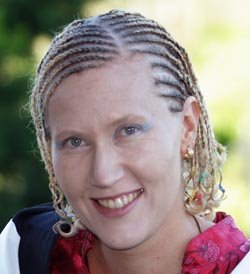The freakonomics of nappy hair
One of my favourite reads in the last six months was Steven Levitt and Stephen Dubner's Freakonomics, which takes the sort of analytical tools we're taught in first year law/economics/commerce courses and applies them to, well, the sort of stuff that economists don't usually apply them to. There's an interesting analysis of the impact 'trailer park' names have on economic outcomes, and on the link between legalised abortion and decreasing crime rates.
I'm not sure how accurate all this is - I'm currently reading the source studies they quote on the abortion issue - but my hunch (and research) thus far indicates that Levitt and Dubner are on to something. The book also includes the most elegant explanation of regression you're ever likely to see - it's worth reading just for this. In that spirit, then - and in light of the fact that I lured people to this blog with pictures of my DOG in my last post - I'm posing a few freakonomics questions of my own.
Nappy hair
I'm the proud owner of what African-Americans refer to as 'nappy hair'. That is, seriously curly hair. I'm not talking pretty curly, like Nicole Kidman. I'm talking curlier than Guy Sebastian hair. I'm talking hair like this:
 In days gone by, I straightened it. This meant sneaking around to Torres Strait Islander friends' houses (in Logan, where I grew up) and pinching bottles of 'Dark & Lovely' relaxer, imported at great expense from the US, and copping constant questions about my heritage. So I did what countless other women with nappy hair do - I poured chemicals into it to create a sort of reverse perm. I wanted it straight and shiny, like models on the telly. So did they, because kinky, afro hair was considered 'unprofessional', 'untidy' and 'lazy'.
In days gone by, I straightened it. This meant sneaking around to Torres Strait Islander friends' houses (in Logan, where I grew up) and pinching bottles of 'Dark & Lovely' relaxer, imported at great expense from the US, and copping constant questions about my heritage. So I did what countless other women with nappy hair do - I poured chemicals into it to create a sort of reverse perm. I wanted it straight and shiny, like models on the telly. So did they, because kinky, afro hair was considered 'unprofessional', 'untidy' and 'lazy'.Finally, a TSI hairdresser pointed out that my hair would probably fall out one day because of all the crap I was putting in it, and took the time to teach me how to braid and cornrow my hair (no small thing, and she refused to charge for her lessons). I stopped relaxing it, and now nearly always braid or cornrow it - as my profile pic shows.
 That particular style took me six hours and was very much a 'special occasion' effort - for my law graduation last year. I usually do simpler styles that take about three hours to complete. That's a lot of time for a hairdo, I know, but I then don't have to touch it for a month. I keep it moist (very important for those with curly/kinky hair) and never let any chemicals near it.
That particular style took me six hours and was very much a 'special occasion' effort - for my law graduation last year. I usually do simpler styles that take about three hours to complete. That's a lot of time for a hairdo, I know, but I then don't have to touch it for a month. I keep it moist (very important for those with curly/kinky hair) and never let any chemicals near it. Freakonomics
I'm interested in the effect 'natural' hair has on economic outcomes. I know the line in the Lazyboy song that suggests most people take curlyheads less seriously, but is this true? Where's the study to back that assertion up? I've turned up to interviews with cornrows, and with my natural afro (although with plenty of product in it, to make it look shiny and healthy). I've been hired in both circumstances, and rejected as well. I'm not dark skinned - in summer I sport the typical Queenslander's deep tan - something so common that I can't conceive of discrimination based on colour. In winter I'm as light as any other caucasian. Does hair make a difference, and have those generations of curly-headed women who've tortured their hair (literally) to breaking point been doing it for nothing?
This intrigues me, because it's not only a question about race ('if you have hair like that, you must be black') but about employer preferences ('I may espouse tolerance, but in private I believe all young people should dress/look like bank managers'). I'm a lawyer, not an economist, and it does concern me that something so trivial as hair may be prejudicing peoples' employment chances. Is the fact that I'm female relevant? Or have we moved on? Is curly hair sexy? I once had a Muslim (female) colleague suggest that by letting my hair 'go natural' - ie not in braids or cornrows - I was 'inviting' male attention. What does this mean?
Over to the economists - or, should I say, the 'freakonomists'.
6 Comments:
I'm no economist, let alone a freakonomist, but my two cents goes like this: From seeing cornrows daily in L.A. I've never seen anyone who wasn't dark skinned with that style of hair since I moved to Australia 5 years ago. I'm not sure if that says anything about our preferences as a society. I'd say race is still the stronger factor for discrimination though, if it was to occur. Although in a market economy like Australia I'd say merit is still the most important factor. See theory:
"Capitalism, according to classical liberal thinker Milton Friedman, is strengthened by its relative immunity towards traditional human flaws. For instance, with regards to discrimination, a business operating in a competitive capitalist economy is not concerned with the age, sex, religion or any other distinguishing personal characteristic of a potential employee, given that their personal characteristics do not impede their ability to work. Through the self-interest of the individuals comprising a business, in a competitive market employers will have strong motivations to simply choose the best person for the job. Those employers who choose to discriminate on grounds other than skills or suitability for the job are losing a valuable employee, and may face difficulties in the future – especially if that same employee is hired by another firm."
...Except maybe on a subconscious level...I'm not sure how Levitt would approach such a question...
I'm not sure either - I suspect it'd be very hard to design a study to 'test' any sort of hypothesis. Maybe the hairstyle has specific racial connotations, and if the nexus between the two were to be broken, it would involve more caucasians wearing their hair like I do.
That however, may not happen. In a practical sense, cornrows and braids are an attractive way to manage very curly hair without using chemicals. It's actually quite difficult to get cornrows to hold in straight or wavy hair (I know, I've tried, when friends like my hair and have wanted me to do a similar style for them). AFAIK not many white people have frizzy hair, which means they're less inclined to have the same 'management issues'.
Hi, skepticlawyer. So you hang about with that old reprobate Rafe Champion, do you? You go, girl!
Hi Rob,
I'll be able to make that piece available once the next issue of the Skeptic comes out - in the next month or so.
...And thanks for visiting us!
I'm white, and I really want to get cornrows. I just think that it looks really cool.I have brown hair, so do you think that i would look good in cornrows?
Check out Nappturality.com. I think you'd fit right in. If you're skeptical about belong to a mostly African American hair community don't be. If your hair is nappy, you shun chemicals and heat styling, you're welcome on the boards.
Post a Comment
<< Home